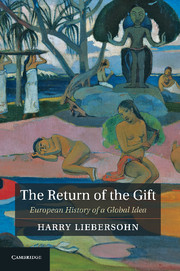4 - Anthropologists and the Power of the Gift
Boas, Thurnwald, Malinowski
Published online by Cambridge University Press: 10 January 2011
Summary
Around 1900 there was a movement within european culture to get in touch with the instinctive creativity of archaic cultures – as some intellectuals imagined it. The writings of Nietzsche inspired artists and intellectuals to turn to “primitive” peoples for a vitality missing from European society; the new availability of indigenous art in Europe's expanding ethnological museums provided inspiration for movements like Expressionism in the visual arts; steamships, global trade and colonial governments made it possible as never before to visit and live in places like North Africa and Oceania. Most artists and writers knew little about non-European peoples and understood them only superficially even after visits abroad; their primitivism generally appropriated indigenous art for modern European purposes. Nonetheless, their appreciation of indigenous art suggests a nascent receptiveness toward peoples generally approached with ignorance and scorn by Europeans.
Leading sociologists of the prewar era like Émile Durkheim and Max Weber made use of the information about peoples around the world that was pouring into Europe at the beginning of the twentieth century, but they remained primarily interested in the problems of industrial societies. Other social scientists like Franz Boas, Bronislaw Malinowski, and Richard Thurnwald actually lived with tribal peoples and developed new methods for analyzing the specific institutions of their societies. While not entirely free of the evolutionary models and cultural presumptions of their age, they set in motion a fresh empiricism for understanding peoples of North America, Oceania, and other parts of the world whom Europeans governed with the intellectual aid of little more than cultural cliché.
- Type
- Chapter
- Information
- The Return of the GiftEuropean History of a Global Idea, pp. 95 - 138Publisher: Cambridge University PressPrint publication year: 2010



